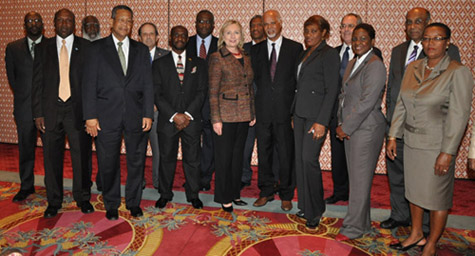
During her June 22 visit to Jamaica, Secretary of State Hillary Rodham Clinton announced progress on existing programs and new initiatives between the United States and the Caribbean as part of the Energy and Climate Partnership of the Americas (ECPA) and U.S.-Brazil Biofuels Cooperation. For more information about ECPA, please visit
www.ecpamericas.org and
www.whitehouse.gov/sites/default/files/ecpa_factsheet.pdf.
- Caribbean Climate Change Adaptation Initiative: Secretary Clinton invited all Caribbean countries to join a new ECPA initiative to build permanent, regional capacity in the area of climate change adaptation. The initiative will focus on acquiring and modeling Caribbean specific data for use in planning and policy decisions. Through a grant to Higher Education for Development, the ECPA Caribbean Adaptation Initiative will partner one or more U.S. higher education institutions with the University of the West Indies to enhance research, expand higher education programs, and promote outreach to policy-makers.
- Sustainable Energy in the Caribbean: Six Technical Assistance Projects Awarded: Following through on her April 2010 invitation to Caribbean governments to join the ECPA Caribbean partnership administered by the Organization of American States (OAS), Secretary Clinton announced that six Caribbean governments will receive technical assistance grants to accelerate renewable energy development. This announcement follows the October 2010 meeting of the ECPA Caribbean Sustainable Energy Dialogue in The Bahamas, where the OAS invited all Caribbean governments to submit proposals. The OAS received more than 20 proposals and selected the top six based on technical merit.
- Antigua & Barbuda: Eco-Friendly Power Generation in the National Parks to encourage the use of solar energy technologies.
- Dominica: Solar Water Heating Awareness Initiative to encourage the use of solar water heaters in the residential and commercial sectors, including tourism.
- Dominican Republic: Photovoltaic (PV) Solar System for Comisión Nacional de la Energía (CNE) Headquarters to install a demonstration PV solar system in parallel with the utility grid to supply a portion of the CNE headquarter’s electricity demand.
- Grenada: Development of a Geothermal Resource Development Bill will provide legal assistance in drafting a Geothermal Resource Bill to advance preliminary assessments of constructing a small scale geothermal plant.
- Jamaica: Wind Powered Irrigation Feasibility Assessment to evaluate the technical and financial feasibility of implementing wind power at pumping stations in the St. Elizabeth Parish.
- Saint Vincent and the Grenadines: Photovoltaic Project for the Administrative Building to fund a feasibility study of net-metering to promote the use of renewable energy.
- Exploring the Potential for Electrical Interconnection between St. Kitts and Nevis and Puerto Rico: As part of the ECPA Caribbean Initiative administered by the OAS, Secretary Clinton announced the OAS request for proposals to examine the potential for an electrical interconnection via sub-sea cables between St. Kitts and Nevis and Puerto Rico. This analysis will complement the planned development of geothermal power in St. Kitts and Nevis, potentially enabling the export of clean renewable electricity to Puerto Rico. Secretary Clinton also commended the World Bank for promoting Caribbean energy security, including a feasibility study examining a possible interconnection between the Dominican Republic and Puerto Rico. She also highlighted the ongoing analysis of the potential for interconnection between Puerto Rico and the U.S. Virgin Islands, supported by the U.S. Department of Energy.
- Third Caribbean Sustainable Energy Dialogue: Secretary Clinton announced that the third Caribbean Sustainable Energy Dialogue will take place in Barbados in October 2011, on the margins of the private sector Caribbean Renewable Energy Forum. The ECPA Caribbean Sustainable Energy Dialogue, supported by the ECPA Caribbean Initiative, brings together Caribbean energy officials and institutions — including CARICOM, CARILEC, donor governments, multilateral institutions, and the private sector — to accelerate clean energy deployment, provide legal and technical advice to governments considering new renewable energy and energy efficiency projects, and discuss possible regional solutions to Caribbean energy challenges.
- Advancing U.S.-Brazil Biofuels Cooperation in Jamaica: Secretary Clinton commended Jamaica for implementing a biofuels policy, including the blending mandate of 10 percent of ethanol (E10) into local gasoline mixes and the creation of a domestic Task Force on Biofuels. The Department of State provides technical assistance to Jamaica under the U.S.-Brazil Memorandum of Understanding to Advance Cooperation on Biofuels. Citing the recent release of key findings from this cooperation and a June 8 visit to Jamaica by a team of OAS and technical consultants, Secretary Clinton encouraged the Government of Jamaica in its efforts to develop a local competitive and sustainable biofuels industry. By deepening collaboration with the private sector, improving agricultural efficiency, and creating a regulatory environment conducive to grid-connected cogeneration from agricultural residue, Jamaica may eventually be able to satisfy its domestic biofuels demand, create jobs, as well as reduce oil imports and green house gas emissions.
U.S. Secretary of State Hillary Rodham Clinton with other foreign ministers in the Caribbean Community (CARICOM) at a reception in Montego Bay, Jamaica. (State Department photo)

 During her June 22 visit to Jamaica, Secretary of State Hillary Rodham Clinton announced progress on existing programs and new initiatives between the United States and the Caribbean as part of the Energy and Climate Partnership of the Americas (ECPA) and U.S.-Brazil Biofuels Cooperation. For more information about ECPA, please visit www.ecpamericas.org and www.whitehouse.gov/sites/default/files/ecpa_factsheet.pdf.
During her June 22 visit to Jamaica, Secretary of State Hillary Rodham Clinton announced progress on existing programs and new initiatives between the United States and the Caribbean as part of the Energy and Climate Partnership of the Americas (ECPA) and U.S.-Brazil Biofuels Cooperation. For more information about ECPA, please visit www.ecpamericas.org and www.whitehouse.gov/sites/default/files/ecpa_factsheet.pdf.
 View Map
View Map